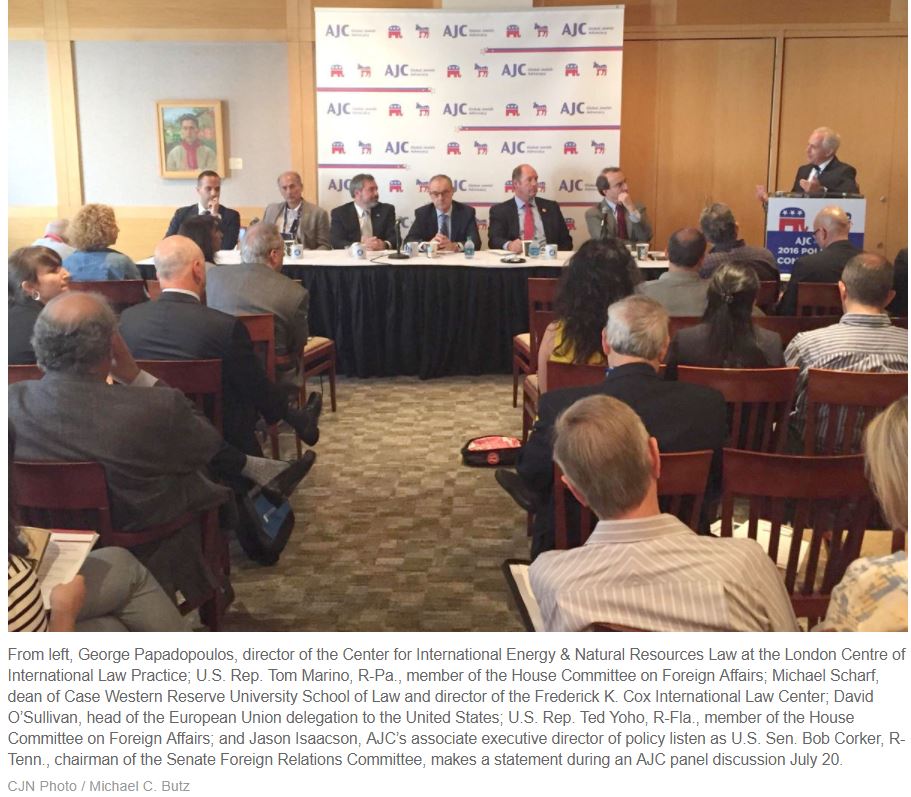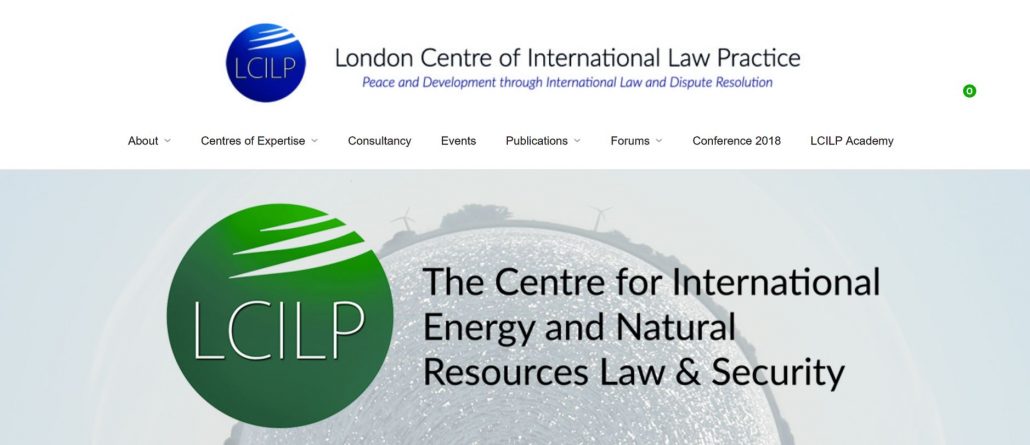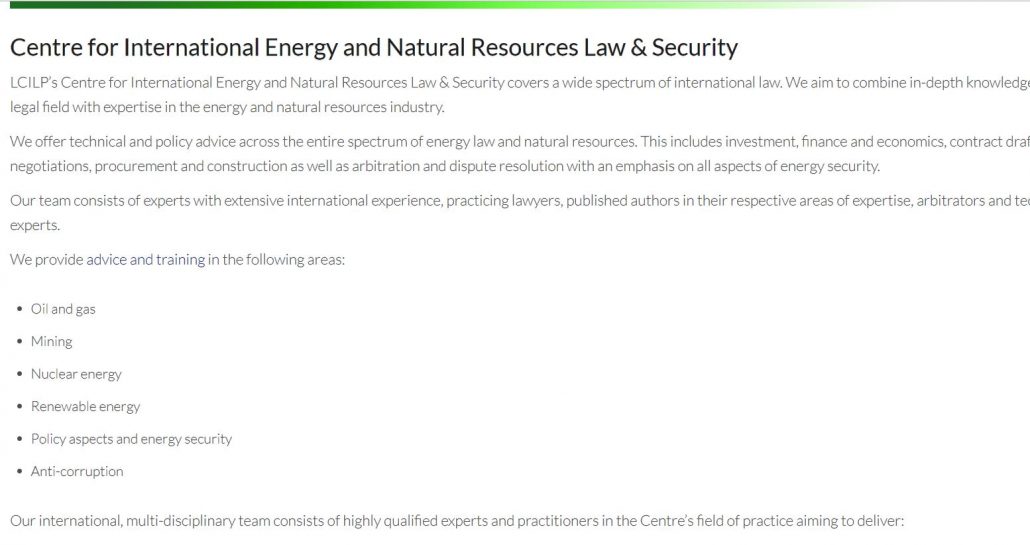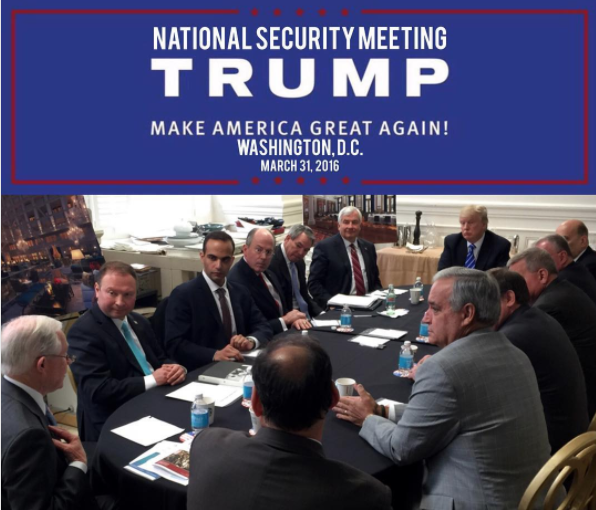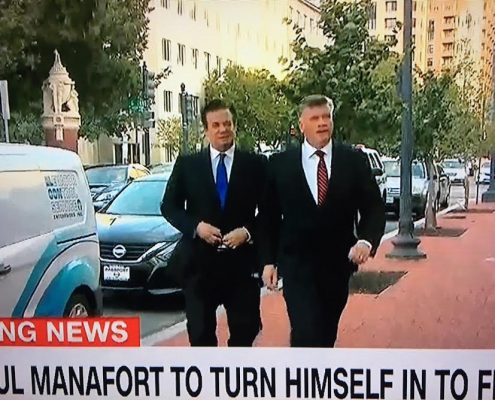On July 2016 Panel, George Papadopoulos Used Same Cover Organization as Joseph Mifsud
Last night, Scott Dworkin tweeted the photo above, stating “Photo: GOP Senator Bob Corker, GOP Rep Ted Yoho, GOP Rep Tom Marino & speaking on panel with convicted Trump Advisor George Papadopolous”. As a constituent of Yoho, this really stood out to me, so I poked around and found (as, I learned later, did folks responding to Dworkin’s tweet) the source of the photo. It comes from this article in Cleveland Jewish News published on July 21, 2016. The article describes an American Jewish Committee panel discussion held in Cleveland during the Republican National Convention. The panel was held on July 20 and the convention spanned July 18 to July 21. The article describes the Republicans on the panel objecting to the JCPOA under which Iran has reduced its capacity to enrich uranium. It makes no mention of anything that Papapodopolous said.
What is astounding here is how Papadopoulos is described. As captured in the photo caption, he is listed as “director of the Center for International Energy & Natural Resources Law at the London Centre of International Law Practice”. Three things stand out from this brief description.
1, No Claimed Association With Trump Campaign
Even though Papadopoulos had been named to Trump’s national security advisory board in March, and as multiple outlets have reported, he then made international appearances claiming to be working for the campaign, no association with the campaign is listed, even though he is being given a falsely inflated title and is appearing with a number of Republican politicians on a panel in the host city during the Republican National Convention. There is no evidence that Papadopoulos ever went to law school, so being listed as the director of an organization with law in its title is laughable. Why did he not claim association with the campaign when giving the false cover identity to the person who wrote the article for Cleveland Jewish News?
2. London Centre of International Law Practice Also a Cover Identity for Mifsud
Most of the biographies of Joseph Mifsud, the shadowy “academic” who, in the Papadopoulos plea agreement was the one who offered to provide Russian “dirt” on Hillary Clinton to the Trump campaign, say that his cover identity was with what may be a mythical London Academy of Diplomacy. According to The Guardian, the London Academy of Diplomacy is starting to disappear:
Today, there is no sign of the London Academy of Diplomacy on Middlesex Street in London. Phone numbers for the organisation that can be found online do not work and websites lead to error messages. A receptionist at the address said the organisation left the premises six months ago.
But this Washington Post article has more. Mifsud has another association in London:
According to a biography on the London Centre of International Law Practice’s website, which was deleted Sunday, Mifsud “served prominently” in Malta’s Ministry of Foreign Affairs and worked as an adviser for Malta’s Ministry of Education.
The London Centre of International Law Practice, you will note, is also the claimed umbrella under which the Center for International Energy and Natural Resources Law falls in the Papadopoulos cover used in Cleveland. Isn’t that interesting?
A look at the current version of the website for the center Papadopulos claimed to run is now very nondescript, presumably having been scrubbed when Mifsud was removed from the parent organization.
Here is the landing page as I saw it this morning:
And that leads us to the third point:
3. First Mention of Papadopoulos as “Energy and Oil Consultant” Since Trump in March 2016
This is what really stands out to me. Nothing in Papadopoulos’ history suggests any experience or expertise in energy, either nuclear as discussed on the panel in Cleveland, or oil and gas as listed first for the center he is claiming to direct. But let’s go back to when Trump first introduced us to Papadopoulos. From a more recent Washington Post article:
On March 21, Trump included Papadopoulos among five men he announced were advising him on matters of national security in a meeting with The Washington Post editorial board. “An energy and oil consultant. Excellent guy,” Trump said.
So Trump’s first announcement of Papadopoulos to his team in March of 2016 fits with the entirely false identity that Papapopolous used in July 2016 during the Republican National Convention. And that false identity is under the same organizational umbrella as one of the disappearing associations for Joseph Mifsud.
Update
Okay, it appears that Papadopoulos had at least lied about having energy experience when he applied to the Trump campaign.
Update 2
Commenter David Sanger provides us with a Wayback machine copy of Papadopoulos’ biography from the LCILP website. It is glorious in the description of him and the photo matches. We really have to wonder who created this history for him and how he was able to pull it off.
Update 3
The spelling of Papadopoulos has been corrected throughout.

